Can water infrastructure be fixed in Lynnville, Giles Co. after recent 15-day shortage?
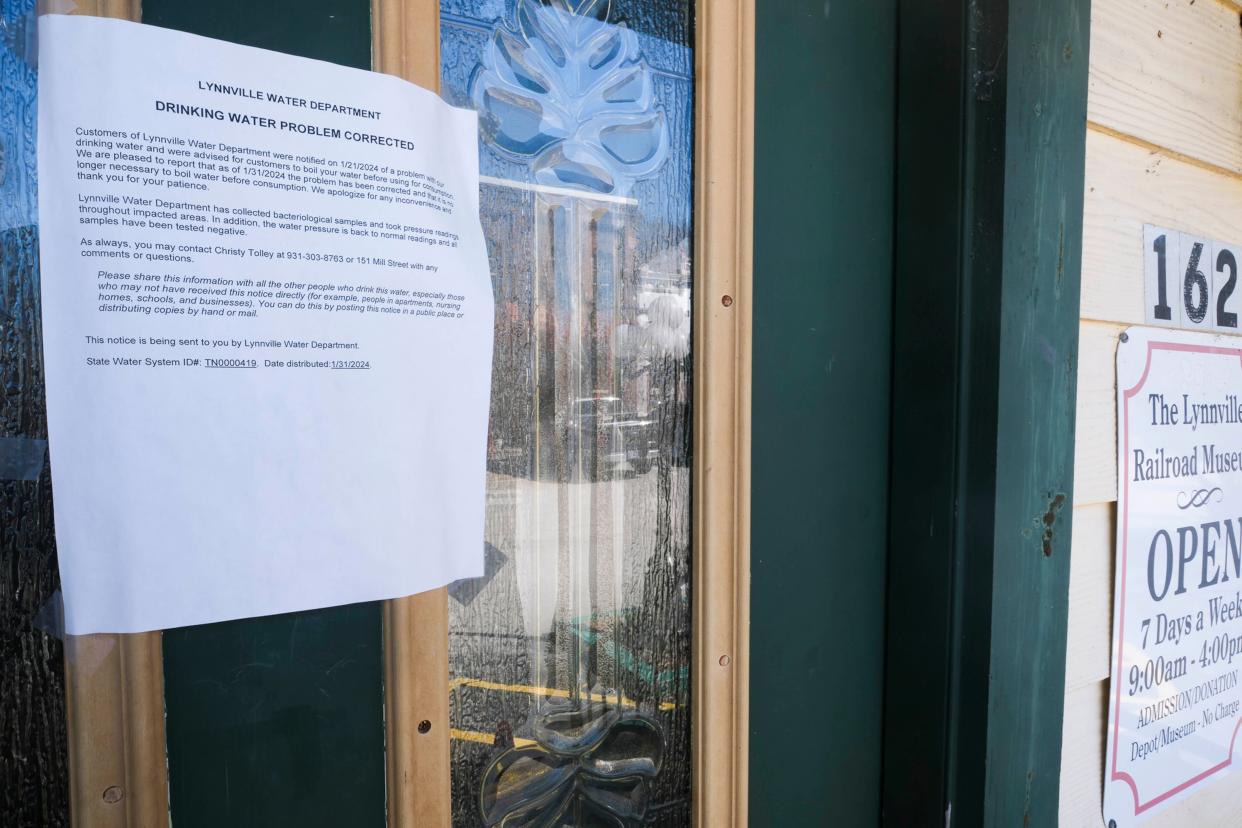
In Lynnville, residents faced great hardship when their basic need for water was in jeopardy when pipes froze, leaks sprung and the city water tank reached dangerously low levels during frigid temperatures in mid-January, leaving much of the town without running water for almost a week. Some went without for 15 days.
A town known for its Blackberry Festival, juicy burgers at Soda Pop Junction and the historic Train Depot, stood at a standstill for almost two weeks.
A little over a month has gone by since the big freeze, and the town is recovering and reflecting on the experience.
The county executive and water department have commented about the county and city's future response and prevention if a similar situation occurs.
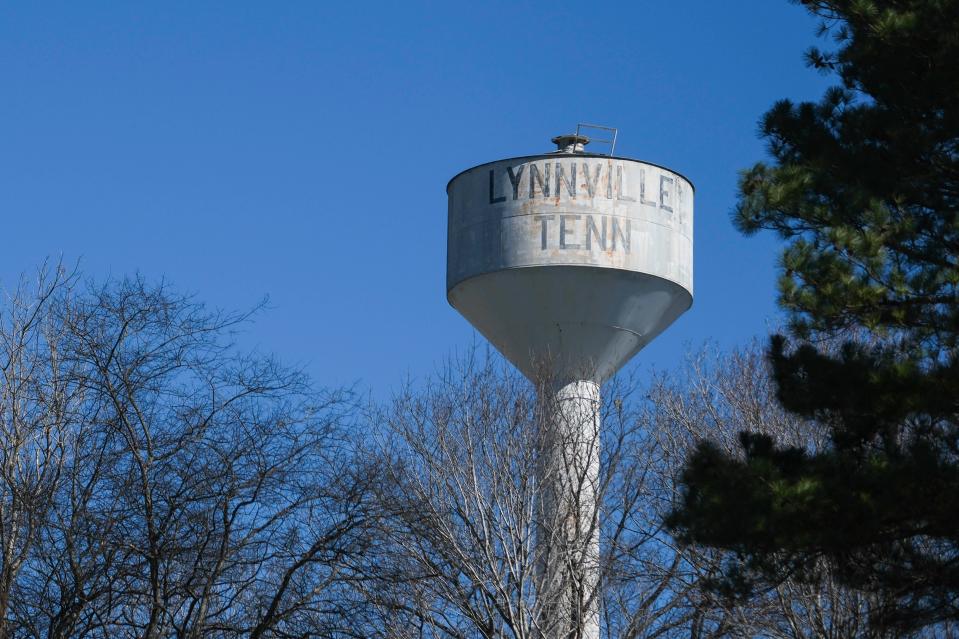
Some, like Judy Roberts, a 59-year career teacher who runs Miss Judy's Academy Preschool and Daycare, said the situation forced her to close school for a week.
"I did have to close my school, but I don't have any ill feelings about it. It's just something that happened, and we had to bear with it, live through it," Roberts said.
"Everything is fine now, but we did have to close and just do what they asked us to do. I think the pipes were just old and can all spring leaks. I'm old too and don't work like I used to either, so I don't think you can lay any blame on anyone when things like this happen, you just have to live through it."
Not only was there no running water to drink, but the dry spell caused many local businesses to close, as well as families to go without the ability to cook, clean or even use the bathroom.
And amid the emergency, City Hall flooded.
"You just have to handle things as they come along, and we all just had to make the best of it," Roberts said. "I didn't hear any big complaints from anybody. We just had to make the best of it. I'm happy it's been fixed now, and if it happens again, we'll just handle it as it comes along."
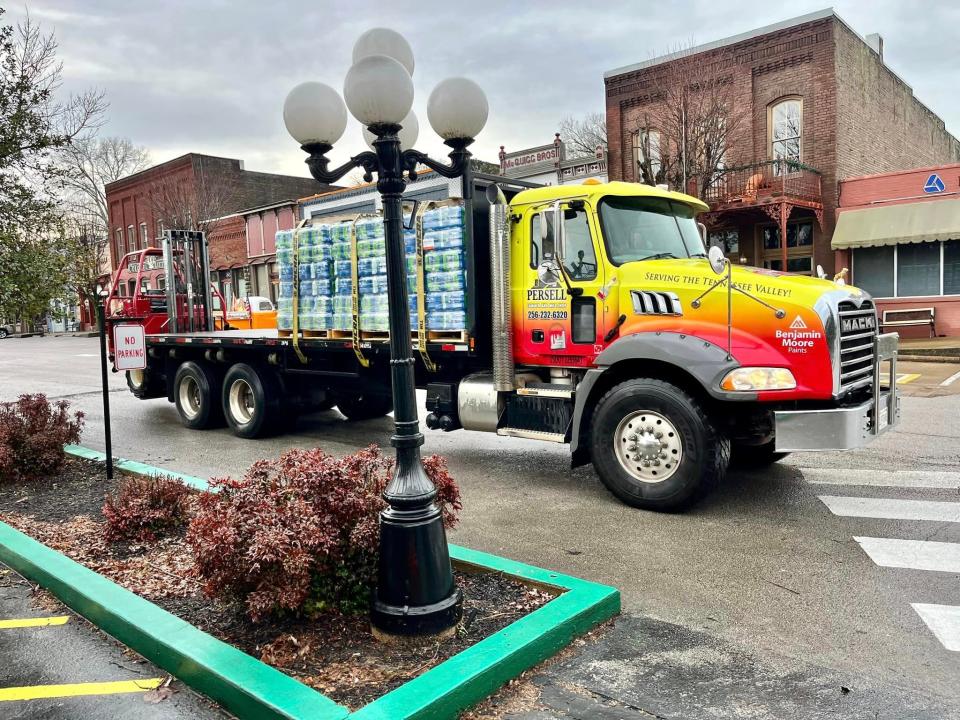
Old infrastructure, ' a design problem' not built for 0 degrees
Giles County Executive Graham Stowe said one of the leading causes of the shortage was due to the aging of the infrastructure, which dates back more than 70 years, and its durability to withstand below freezing temperatures.
He said that's what primarily led to the county's water shortage, because once the main lines freeze, the reserves could not be properly replenished.
"Water is life, and with our infrastructure, if your water lines are below a certain depth, you're going to be in trouble. And when the temperature drops below zero, and the water lines are made to withstand down to 15 degrees, it's a design problem," Stowe said.
Plus, the only two water sources feeding into Lynnville are from Fairview and Lewisburg, both of which were affected by the freeze.
Lynnville Water Department Director Christy Tolley said the department serves roughly over 600 water meters and 42 miles of lines, which rely on two other water providers in Lewisburg and Fairview.
"It was a trickledown effect that impacted many utility districts, including ours. We were fortunate to get a little bit of a heads up, and so as soon as we notified our customers, we immediately took action," Tolley said. "We could tell them to conserve water and that we weren't getting any water."
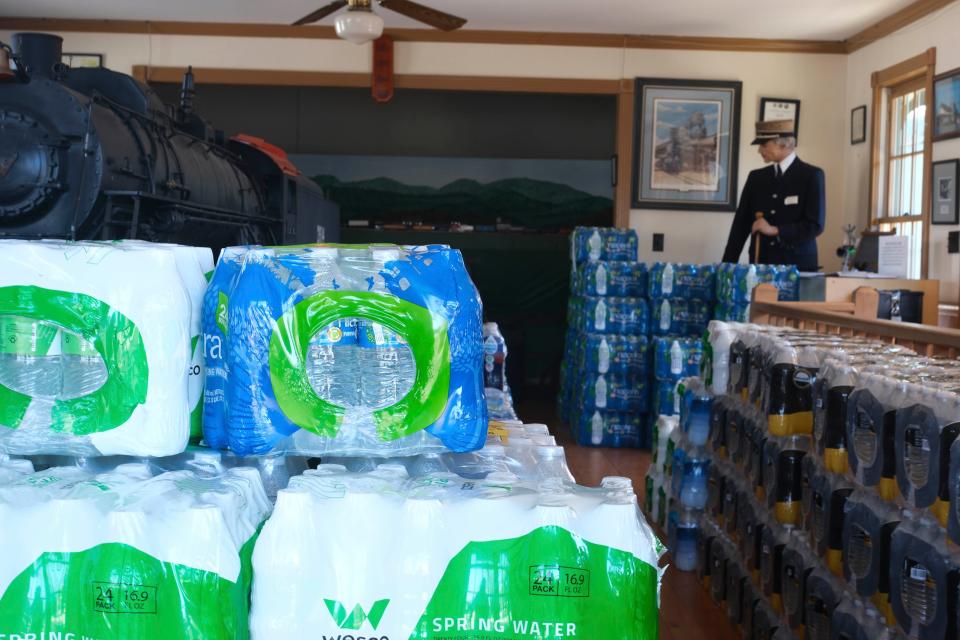
Lynnville City Administration began notifying residents as soon as cold weather hit that the water tank was becoming dangerously low.
Tolley added that, in total, workers found 19 leaks in the piping, including a few in the water department's office. However, given the age and threshold of the system during frigid temperatures, she considers Lynnville to be "very lucky" with what could have been a much worse situation.
"Our city buildings and businesses received mass amounts of damage," Tolley said. "Our office actually flooded. We took a hit, but we're ok."
As of Wednesday, Jan. 31, the Lynnville Water Department issued a statement that all water systems were thankfully back online after the first fall of snow began on Jan. 14.
"We are pleased to report that as of 1/31/2024 the problem has been corrected and that it is no longer necessary to boil water before consumption. We apologize for any inconvenience and thank you for your patience," the water department stated.
Water distributed to residents
Businesses and local organizations pitched in to provide water as the shortage prolonged, with many donations being handed out at Lynnville's train depot throughout the ordeal.
Tennessee Valley Authority also donated more than 700 cases of water.
Troy Elmore Realty and Auction, Persell Lumber and Mill Shop, Traditions Bank and First National Bank donated 600 cases of water.
"Restaurants cannot operate, people cannot shower, cook properly, clean or use their bathrooms. The residents and businesses need help and need more donations," Troy Elmore Realty and Auction posted on social media Jan. 25.
An anonymous "very generous and kind man" offered water at no cost from his well, the city posted on Jan 23.
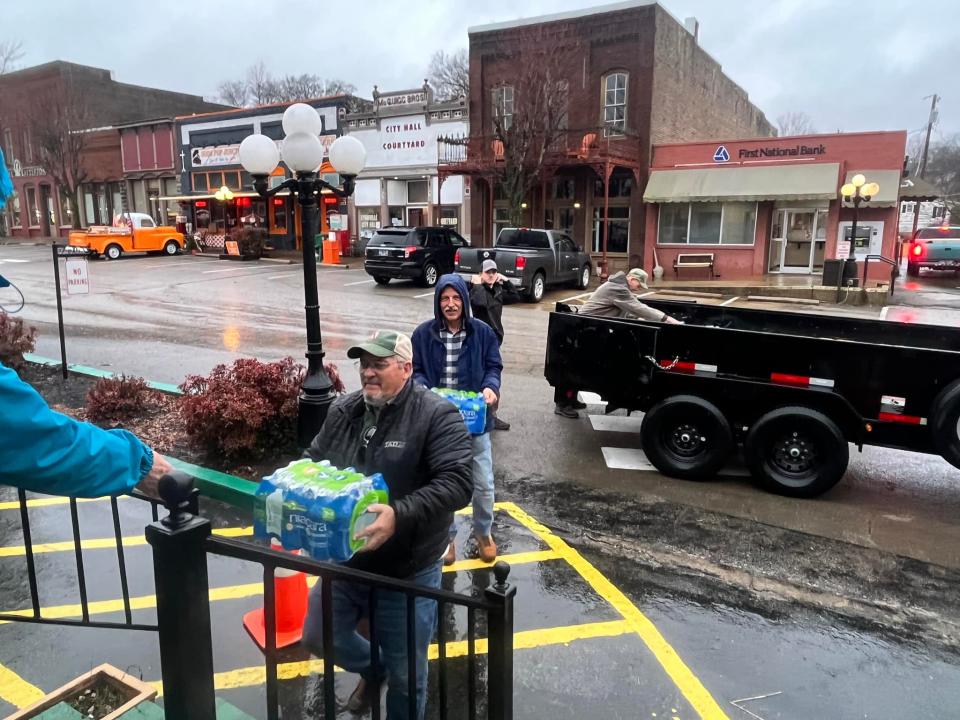
'Love thy neighbor': Coming together in a time of crisis
One of the biggest takeaways, Tolley said, was how the community as a whole reacted through water donations delivered to each customer, as well as donations from churches, businesses and volunteers not just from Giles County, but the surrounding areas.
"Lynnville is a very aging community, and we have a lot of people with just one person in the home, and so to see the true meaning of Christianity to 'love thy neighbor.' It was very much that here," Tolley said.
"We needed to come together, and they did just that. We had people walking in groups delivering water. It was absolutely unbelievable. People were holding hands and praying at the distribution centers where they were giving out water. It was a crisis, for sure, but it was also a really beautiful thing that took place in our community, people coming together."
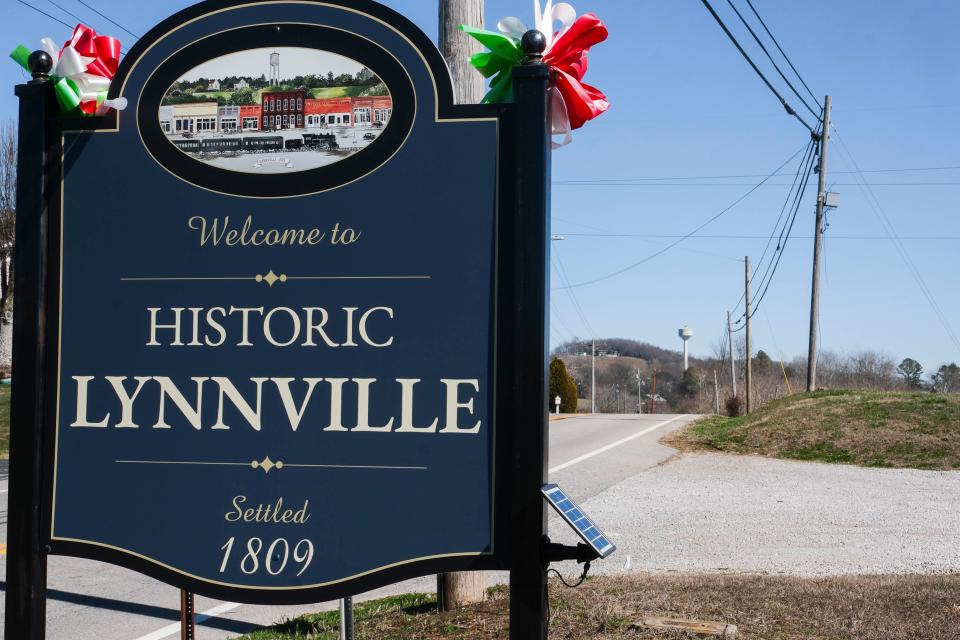
Giles County Executive addresses pipe freeze
Stowe said between the age, the location of the pipes underground and temperatures dropping below 15 degrees were all contributing factors to the pipes freezing and the resulting massive shortage, as well as subsequent leaks.
However, Stowe said one of the bigger takeaways from the whole experience was how the community, businesses and neighbors came together to help.
"There's no question that this was a huge inconvenience, but what heartens me is that people were out there helping their neighbors," Stowe said.
"The bottom line is, if this happened again next month, we'll be doing the same thing to help."
Next time: Communication could be improved, GIS mapping
Preventing an event like this from happening again won't be very easy, or cheap, Stowe said, but some solutions are being implemented to provide more efficiency in the future.
Reconfiguring the county's water system would cost millions, Stowe said. In the meantime, much of the issues during a time of crisis such as water being shut off first comes down to proper communication, he said.

"One of the biggest challenges, and this isn't any different from any other crisis, is communication. One of the challenges is that the city of Pulaski has the water plant, and the four other districts that are fed from that, and the public wasn't really getting any information from those sources," Stowe said.
"One thing I hope we can get better at next time is getting communications out to the public."
Another task Stowe said is being done is mapping out where each and every water line is installed, some of which were installed more than 70 years ago. Part of this will be accomplished by a $2.7 million Tennessee Department of Environment and Conservation (TDEC) grant to conduct Geographic Information System (GIS) mapping of all the county's water lines.
By conducting GIS mapping, Stowe said, it will allow the water districts to pinpoint breaks and other potential hazards much quicker.
"That grant will go out of all of the water districts, because the county doesn't own the water system. These are all rural utility districts," Stowe said.
"The analogy is to compare it to the power grid and where you get your power from. The water comes from these rural utility districts, and the county tries to sponsor them using grants, because we don't have a county engineer or county water employees. What we do is try to support them with anything from getting grants to encouraging consolidation of the utility districts. I think that is important."
Jay Powell is a general reporter for The Daily Herald. Get up-to-date news in your inbox by subscribing to The Daily Herald newsletter at www.ColumbiaDailyHerald.com.
This article originally appeared on The Daily Herald: Giles Co., Lynnville recovers from recent water shortage after freeze

